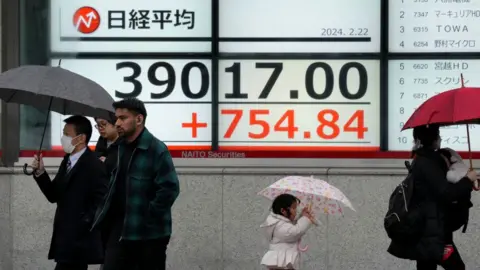Nikkei: Japan's main stock index closes above 1989 record high
 EPA-EFE/REX/Shutterstock
EPA-EFE/REX/ShutterstockJapan's main stock index has hit an all-time closing high, surpassing the previous record set 34 years ago.
The Nikkei 225 rose 2.19% on Thursday to end the trading day at 39,098.68.
That topped the previous record closing high of 38,915.87 set on 29 December 1989, the last day of trading that decade.
Asian technology shares were boosted after US chip giant Nvidia revealed strong earnings, driven by demand for its artificial intelligence processors.
Global investors are returning to the benchmark index thanks to strong company earnings, even as the country's economy has fallen into a recession.
The weakness of the Japanese currency has also helped to boost share prices of Japan's exporters as it makes their products cheaper in overseas markets.
The Nikkei 225 hit its previous record high after years of soaring stock and property prices.
Less than three years after that peak the benchmark index had lost almost 60% of its value as the Japanese economy was engulfed in an economic crisis.
Since then the Japan has struggled with little or no economic growth and falling prices, known as deflation.
Deflation is bad for an economy as persistent price declines mean that consumers tend to hold off from buying big ticket items due to the expectation that they will be cheaper in the future.
Last week, official figures showed that the Japanese economy had unexpectedly slipped into recession in the last three months of 2023.
The country's gross domestic product (GDP) contracted by a worse-than-expected 0.4% in the last three months of 2023, compared to a year earlier.
It came after the economy shrank by 3.3% in the previous quarter.
The figures from Japan's Cabinet Office also indicate that the country has lost its position as the world's third-largest economy to Germany.
The latest figures were the first reading of Japan's economic growth for the period and could still be revised.
Two quarters in a row of economic contraction are typically considered the definition of a technical recession.
